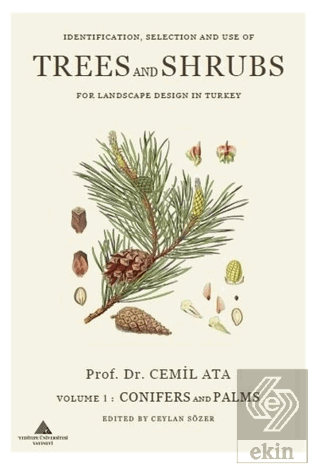
Trees and shrubs that are suitable for planting on landscape planning of Turkey can be divided into three big plant groups, a) Conifers and their allies b) Broadleaves, and c) Palms. In this book conifers and their allies and Palms will be studied. Broadleaves will be studied in the book's Volume 2.
Landscape architects have to know about trees and shrubs, but the students of landscape architecture are not going to be botanists. They do not need to know details of microscopic characteristics that are not visible to the naked eye. For that reason, general botanical features of plants for identification will be explained and growing conditions and ecological characteristics of woody plants and palms will be studied in this book. According to the botanical definition, Palms are not trees but they are as tall as trees, and in fact they are large herbs. Some palm species are very important and striking tall plants, so palms are also included and studied in this book.
A landscape architect should know about one thousand tree and shrub species and their forms, varieties and cultivars. More than one thousand woody plant species have been used for landscape planning in Turkey for years and the new species which are native to Turkey or exotic species are being added to this big amount of number of trees and shrubs. It is impossible for a landscape architect for the best designing and planning of a landscape area without having the identification knowledge of plants, and the growing characteristics of plants. For that reason, the trees and the shrubs used for landscape design in Turkey will be studied and their growing conditions will be explained in this book.
Trees and shrubs that are suitable for planting on landscape planning of Turkey can be divided into three big plant groups, a) Conifers and their allies b) Broadleaves, and c) Palms. In this book conifers and their allies and Palms will be studied. Broadleaves will be studied in the book's Volume 2.
Landscape architects have to know about trees and shrubs, but the students of landscape architecture are not going to be botanists. They do not need to know details of microscopic characteristics that are not visible to the naked eye. For that reason, general botanical features of plants for identification will be explained and growing conditions and ecological characteristics of woody plants and palms will be studied in this book. According to the botanical definition, Palms are not trees but they are as tall as trees, and in fact they are large herbs. Some palm species are very important and striking tall plants, so palms are also included and studied in this book.
A landscape architect should know about one thousand tree and shrub species and their forms, varieties and cultivars. More than one thousand woody plant species have been used for landscape planning in Turkey for years and the new species which are native to Turkey or exotic species are being added to this big amount of number of trees and shrubs. It is impossible for a landscape architect for the best designing and planning of a landscape area without having the identification knowledge of plants, and the growing characteristics of plants. For that reason, the trees and the shrubs used for landscape design in Turkey will be studied and their growing conditions will be explained in this book.
| Taksit Sayısı | Taksit tutarı | Genel Toplam |
|---|---|---|
| Tek Çekim | 108,00 | 108,00 |
| 2 | 56,16 | 112,32 |
| 3 | 38,88 | 116,64 |
| Taksit Sayısı | Taksit tutarı | Genel Toplam |
|---|---|---|
| Tek Çekim | 108,00 | 108,00 |
| 2 | 56,16 | 112,32 |
| 3 | 38,88 | 116,64 |
| Taksit Sayısı | Taksit tutarı | Genel Toplam |
|---|---|---|
| Tek Çekim | 108,00 | 108,00 |
| 2 | 56,16 | 112,32 |
| 3 | 38,88 | 116,64 |















